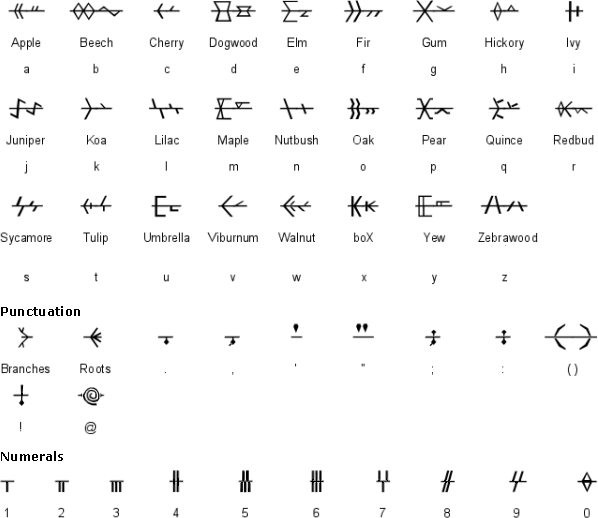Michael McIntyre (dmmcintyr[at]users[dot]sourceforge[dot]net) created the Applebeech in the spring of 2005 in order to serve as a fully functional runic writing system for the modern English language. It is intended to be used for obfuscating messages without making it necessary to alter their natural spelling. He uses it for inscriptions set in concrete around his garden, for example.
Many ancient inscriptions found on the British Isles used the Ogham and the Futhark, and both of these were used to write in a variety of languages on the Isles in days of yore. However, neither of these allows a simple one-to-one correspondence with the more commonly-used Latin alphabet. The Applebeech combines elements of both of these ancient systems into a complete new alphabet of trees which is an Ogham-like expression of Futhark-like runes.
The Applebeech is currently only useful for writing modern English. It will eventually acquire characters for Spanish, French and Esperanto.

All of the letters are composed entirely of straight lines because this is a writing system intended to be hacked into things with a set of two chisels (one twice as wide as the other). Many of the uppercase characters are straightened out versions of their Futhark counterparts turned on their side (horizontally, or in their normal orientation vertically), and some are mirrored. The lowercase forms extend only half as far above and below the line as their uppercase counterparts, and most of them are abbreviated to roughly half the number of strokes.
For example, the letter Apple is very similar to its Futhark counterpart rotated 90 degrees counterclockwise, and then mirrored. The lowercase form is shorter, and is not mirrored.

Some letters, such as Maple, are not mirrored, but merely turned on their sides, with the lowercase form abbreviated by randomly chopping off the top or the bottom.
The punctuation characters are not so easy to hack with straight chisels, and would require some finer chisel work with a third, much more narrow chisel, or perhaps some specially-ground punches. This is a failing, but the alphabet's creator assumes that anyone using such characters will probably be writing at a computer, with a font, rather than hacking on a hunk of wood with some sharp bits of metal. They are mostly included for simple "Applebeechification" of existing texts, and have not been as well thought-out or as well-executed as the letters themselves. (The applebeechmedium font includes many glyphs not depicted above because they look too bad. Punctuation is a work in progress).

All human beings are born free and equal in dignity and rights. They
are endowed with reason and conscience and should act towards one another
in a spirit of brotherhood.
(Article 1 of the Universal Declaration of Human Rights)
Download a font for the Applebeech alphabet (TrueType, 4K)
Constructed scripts for: Ainu | Arabic | Chinese languages | Dutch | English | Hawaiian | Hungarian | Japanese | Korean | Lingala | Malay & Indonesian | Persian | Tagalog / Filipino | Russian | Sanskrit | Spanish | Taino | Turkish | Vietnamese | Welsh | Other natural languages | Colour-based scripts | Tactile scripts | Phonetic/universal scripts | Constructed scripts for constructed languages | Adaptations of existing alphabets | Fictional alphabets | Magical alphabets | A-Z index | How to submit a constructed script
[top]
You can support this site by Buying Me A Coffee, and if you like what you see on this page, you can use the buttons below to share it with people you know.

If you like this site and find it useful, you can support it by making a donation via PayPal or Patreon, or by contributing in other ways. Omniglot is how I make my living.
Note: all links on this site to Amazon.com, Amazon.co.uk
and Amazon.fr
are affiliate links. This means I earn a commission if you click on any of them and buy something. So by clicking on these links you can help to support this site.
[top]